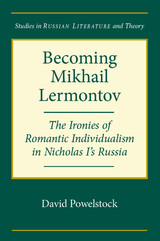
By bringing to light Lermontov's operative version of Romantic individualism, Powelstock is able to make sense of the poet's relationship to "romantic irony," his highly modern concept of the reader (both real, and implied in the text), and his vexed passion for his predecessor Alexander Pushkin--a relationship that is almost always treated sentimentally, but is here given its true competitive edge. Furthermore, Powelstock offers the most persuasive account ever given of Lermontov's exceptionally odd treatment of, and success with, women--both in real life and in fiction--and of his cruel overlapping of these two planes.
Clarifying what has remained perplexing for so long, and correcting what has been misinterpreted, Powelstock's work illuminates Lermontov's views of dignity, death, love, nature, society, and ethics--and, finally, gives us an intellectual biography that is deeper and more subtle than any written before.

The early decades of the nineteenth century in Imperial Russia embraced a sequence of catastrophic events—the assassination of Paul I, Napoleon’s invasion, the Decembrist rebellion, the cholera epidemic, the Polish uprising—along with radical changes in the fabric of society. Yet, far from exhausted by these convulsions, Russian literature blossomed as never before, producing the first in the long line of novels now regarded as masterpieces throughout the world. With all the sentimentality, nostalgia, and mythic echoes the term evokes, posterity has called this the golden age of Russian letters.
William Mills Todd describes the ideology of the educated westernized gentry (obshchestvo) of the time, then charts the various possibilities for literary life: first patronage, the salons, popular literature; then the rapid emergence of an incipient literary profession, which was encouraged by copyright laws, journals and booksellers, and an increasing readership. Through an examination of three brilliant fictions—Pushkin’s Eugene Onegin, Lermontov’s A Hero of Our Time, and Gogol’s Dead Souls—he explores the complicated interactions of literature and society as these writers “discovered” their own milieu and were discovered by it, confronting the fragility, exclusiveness, and potential for hypocrisy and self-delusion in Russian culture. Todd’s interdisciplinary approach will ensure his book’s appeal to students of comparative and other national literatures as well as of Russian culture.
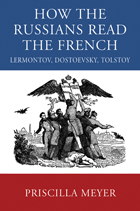
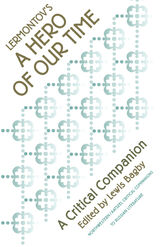
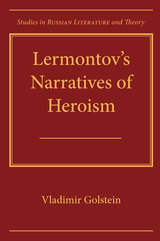
Lermontov's explorations of the virtues and limitations of heroic, self-reliant conduct have subsequently become obscured or misread. This new book focuses upon the peculiar, disturbing, and arguably most central feature of Russian culture: its suspicion of and hostility toward individual achievement and self-assertion. The analysis and interpretation of Lermontov's texts enables Golstein to address broader cultural issues by exploring the reasons behind the persistent misreading of Lermontov's major works and by investigating the cultural attitudes that shaped Russia's reaction to the challenges of modernity.
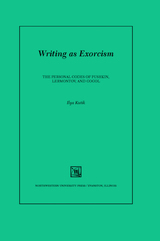
A remarkable literary performance in its own right, this interpretive essay brings a highly original poetic sensibility to bear on the lives and works of three major Russian writers. It is Ilya Kutik's contention that many writers are tormented by secret fears and desires that only writing—in particular, the use of certain words and images—can exorcise. Making this biographical approach peculiarly his own—and susceptible to the nuances of comedy, tragedy, and critical equanimity—Kutik reads works of Alexander Pushkin, Mikhail Lermontov, and Nikolai Gogol, three Russian writers who were demonstrably subject to the whims, superstitions, and talismans that Kutik identifies. Exposing the conjunction of literary effort and private act in writings such as "The Queen of Spades," Dead Souls, and A Hero of Our Time, Kutik's work gives us a new way of understanding these masterpieces of Russian literature and their authors, and a new way of reading the mysteries of life and literature as mutually enriching.
READERS
Browse our collection.
PUBLISHERS
See BiblioVault's publisher services.
STUDENT SERVICES
Files for college accessibility offices.
UChicago Accessibility Resources
home | accessibility | search | about | contact us
BiblioVault ® 2001 - 2025
The University of Chicago Press









